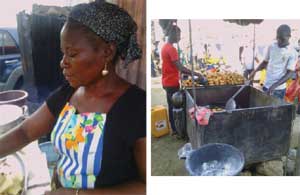A mansion which a Lagos roadside fast food vendor built in Agbara, Ogun State, tells the story of the fortune and the fulfillment in the business.
A photograph of the house would have illustrated this story much more but for his refusal to publish his new status.
Emmanuel Oboh (not his real name) has been frying pastries for eight years. When he realised there is a huge profit to make, he established more outlets and recruited workers to manage each outlet.
He told TheNiche that each business day he and his boys would finish almost half a bag of flour frying puff-puff, egg roll, meat and fish pie, doughnut and many more at three locations.
Oboh is one of many hundreds of fast food vendors in Lagos. A random survey showed a thriving business against the background of widespread unemployment and poverty.
Poverty and hunger in the land seem to have watered the ground for the success of this micro business, no matter the location. The man next door with little money in his pocket goes for akara (bean balls), puff-puff or other variants of fast food.
Affordable fast foods like akara, puff-puff and others offer consumers the energy to carry on with daily drudgery.
With a few balls of quick food in the stomach, the hungry artisan, the indigent school child, and the poverty stricken and distraught citizens keep going until they can afford real food.
At different locations in the Centre of Excellence, TheNiche tracked men and women making handsome profit in the business who unanimously agreed that it is a money spinning one which requires varying degrees of startup capital, depending on the scale.
Two brothers at Iyana Ejigbo bus stop, John and Agha, said they could not get white collar jobs and had to learn preparing fast food about three years ago.
They began by working for someone, who paid each of his four workers N2,000 daily, adding up to N8,000.
Although the workers could not disclose the profit margin of the business, they admitted that they make good profit and do not wish for any other job or business.
John said they later set up their business. Two persons mix the flour indoors while he and his brother fry at the bus stop.
The capital required for a startup “depends on the scale. If it is on a big scale like ours, the starter needs about N120,000,” he said.
With this sum, the beginner buys things like gas cooker, frying pan, bags of flour, cooking oil and other items.
As to whether they derive satisfaction operating in a business associated with females, John replied: “Yes, and I will not hesitate to encourage my relations and friends to go into it. It is a goldmine. I don’t care for any other business or government job.”
He appealed to Kick Against Indiscipline (KAI) and council officials to stop harassing them and demanding bribe.
He argued that since the government cannot create enough jobs for youths like them it should encourage those creating jobs to employ others rather than harassing them and threatening to shut down their business.
Elizabeth Ajayi, an Igbo woman who married a Yoruba man, Kolawole Ajayi, is another fast food vendor who has been in the business since her maiden days.
Her husband died about three years ago and she has been footing bills in the home with proceeds from the business.
Ajayi, who learnt the trade from her mother, fries each day over 10 De-rica cups of beans and several tubers of yam and potatoes at her location in the Ikodo area of Ikeja.
The business hour begins at about 12 noon when most people are going for lunch. For many, a combination of akara and yam is perfect for lunch.
Ajayi’s mother had made a living from the business without depending on her husband.
“Women should not be idle waiting for their husband to cater for all their needs. No woman should rely on the husband to provide her needs because this will put the man under pressure. The result may not be quite good for the home,” Ajayi advised.
She added that whatever a woman can lay her hands to do she should do it and avoid being idle and indulging in gossip. “For an hour spent gossiping could change a life if spent doing good business.”














